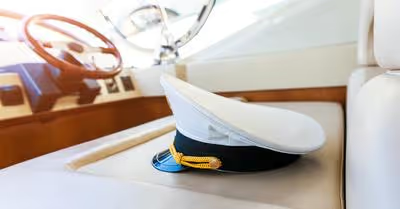
Key Takeaways
- You need a captain’s license when operating with at least one paying passenger.
- Captain’s licenses are needed by the Coast Guard for a personal boat of a certain size.
- Large ships with a crew often require a master license and an inspected vessel.
Captain’s licenses are not always needed to operate water vessels, but you should know when one is required to avoid a heavy fine.
A captain’s license is needed to operate any size boat with at least one paying passenger. You will need a master license to operate inspected vessels with over six paying passengers. If you don’t have a paying passenger, you may still need a OUPV license if your boat size is over 26 feet long.
Even if you’re not a commercial owner or operator for hire, you should know if your boat requires OUPV licenses to meet coast guard requirements. If you’re like me and want to avoid fines, you should read on to learn more about USCG licenses and possible requirements for uninspected passenger vessels.
What Size Boat Do You Need A Captain’s License?
It goes without saying you should follow Coast Guard rules when operating as a commercial yacht, ship, or other vessel owner.
I don’t always boat while carrying passengers or have a crew, but I make sure I follow operator rules to stay within regulations.
You might be surprised that a captain's license is not always required to captain certain types of boats.
Generally speaking, water vessels that are less than 26 feet long may not require a license if there are no paying passengers on board.
Water vessels that are over 26 feet in length may not require a captain’s license if only one person is one board.
Laws and regulations regarding licenses may vary depending on your city, state, or other jurisdiction.
Boats With Passengers For Hire
When paying passengers are on a boat or other vessel, captains of any size vessel may be required to obtain a license in order to operate the vessel.
Though the number of actual passengers allowed on a vessel may vary, a common limit for the number of paying passengers allowed on any size vessel is six.
So whether you are taking a small rowboat or a large yacht out on the waters, a captain’s license would likely be required due to the commercial nature of the voyage.
Other Requirements
Some jurisdictions may set minimum requirements based on other certain factors such as a vessel's length, weight, and height, so you should be sure to read through all specifications before boating anywhere without a license.
A common maximum weight for a vessel being captained with a captain’s license is 100 gross tons.
Jurisdictions outside the United States may have different laws and regulations regarding the need for captain's license, so you should be sure to inquire about specific requirements before going anywhere in a boat or other water vessel.
In many cases, when piloting a smaller boat with family and friends, you may not need to have a license to let everyone pilot the boat.
When I was younger and had virtually no boating experience, an adult boat captain would often allow me to sit near them and steer the vessel.
I’m sure many parents allow their children to steer a car once in a while, but there’s probably a good chance they’d get a ticket if a police officer saw what was going on.
The process to get a captain's license is relatively involved compared to getting a license to drive a road vehicle.
Along with passing health, criminal, and other background checks, you may be required to have many hours of documented sea time with a certified crew and have to pass a lengthy exam covering topics about boating-related rules, navigation, and vessel knowledge.
If you don't have a boat, you may want to join a crew with a qualified captain and other personnel that can mentor you so you get proper training on how to operate a water vessel.
Other than simply steering, accelerating, and stopping, you may need to know how to do things such as perform dock-related tasks, navigate in and out of certain areas, and set an anchor.
Though the total costs associated with getting a captain’s license can widely vary, the general costs may run between $500 to $800.
That amount factors in exam, health check, and other costs directly related to the application and does not factor in the cost to acquire sea time, which could be much more substantial.
The length of validity for a captain's license can also vary based on your jurisdiction, but it is commonly set at a period of 5 years.
If you are required to have a captain’s license, you should be sure to carry it with you before heading out to sea to avoid getting ticketed and fined.
A fine for not having a captain's license can be up to tens of thousands of dollars or more in certain jurisdictions, so taking the risk of boating without a license can be quite heavy.
Resources For A Captain’s License And Master License
You can go to various websites such as Boat Ed and BoatUS to learn more about courses that can improve your boating knowledge.
Though many websites provide information that is laid out in a user-friendly way, it is sometimes difficult to absorb that information without actually seeing certain things in action.
If that is the case with you, you should check out one of the many tutorial videos on websites like YouTube and Vimeo that will give you a better visual understanding of boating processes and walk you through steps required to perform various tasks.
How Can A Boat Captain License Help Me Operate?
Taking a commercial vessel out with paying or non-paying passengers can be quite risky, so it makes sense for licensing requirements to be in place to ensure captains have the proper skills to safely captain a boat.
Simply knowing how a boat works is not enough to lead a safe boating trip, which is why getting actual sea time is important for you and your passengers.
A good captain should also understand how to properly maintain a water vessel when it is not in use to ensure it runs smoothly when it is in use.
Minimize Reliance On The Coast Guard
A captain should also know what to look out for in case potential safety issues arise.
Getting a certain level of sea time should help licensed captains navigate inclement weather and other sea conditions that may be hazardous to a boating trip.
Even if a captain is not qualified to repair a vessel, they should at least understand when mechanical problems are present and know when to take a vessel in for service.
For even greater safety, it is ideal for a captain to understand how to make basic repairs if accidents or malfunctions happen during a trip.
Navigate Coastal Waters Better With A Captain’s License
Due to the somewhat isolated nature of being on a boat in oven water, it can be extremely troublesome for a service boat to make its way out in a timely fashion.
A licensed captain should be able to know what supplies to bring on a given trip.
It is critical to have the proper first aid and other safety equipment on board so every passenger will have the required gear to survive a crash or other accident.


